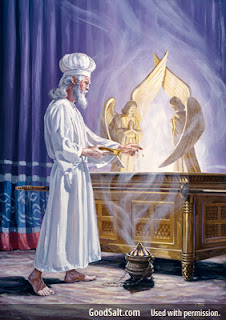Forgive us our trespasses as we forgive those who trespass against us.But search as you will and you will not find that prayer anywhere in any of the translations of the Bible. So where'd we get that anyway? All the major translations (ESV,ASV,NASV,NRSV,KJV, NJ) read: our debts . . . our debtors. Not a single one has the word trespasses. How then did we get started with trespasses rather than debts? The answer: The Tyndale Bible (1526), a translation followed by the Book of Common Prayer (1549). But all the English translations from the King James Version (1611) onward followed the Greek text to translate this petition as Forgive us our debts.
Let's take a look at the idea of debt and forgiveness of debts.
In the third chapter of Paul's letter to the Romans we read about the insurmountable debt we all have piled up before God. Quoting Psalm 14:1-3, Paul writes,
"None is righteous, no, not one; no one understands; no one seeks for God. All have turned aside; together they have become worthless; no one does good, not even one." - Rom 3:10-12 ESVI recently counseled with a lady who said that she owed something like $40,000 in credit card debt. She said she was trying to pay it off, but did not have the means. Because of the insurmountable interest, reaching as high as 29%, her debt keeps growing and growing each month even though she tries to pay it down as best she can. This frightening reality has trapped many who rely upon credit cards. It is the dreadful manner by which the banks behind those cards make so much. And it is all quite legal.
This compares to what the Bible points toward. We simply cannot and never will be able to pay our debts to God. Our accounts are not and cannot be reconciled. The debt continues to mount daily.
But here comes Jesus Christ to redeem us. The image is that of paying a ransom to set hostages or prisoners free. Paul also calls him the propitiation.
(we) are justified by his grace as a gift, through the redemption that is in Christ Jesus, whom God put forward as a propitiation by his blood, to be received by faith. This was to show God's righteousness, because in his divine forbearance he had passed over former sins. - Rom 3:24-25 ESVNo one ever uses that strange word propitiation any longer and it cannot be understood without some background from the Old Testament.
Symbolically, the Mercy-seat (propitiation) concealed from the Lord’s view the commandments of the law. Looking down upon the Mercy-seat He could not see, if you will, the commandments the people had broken. Each year, on the Day of Atonement (Leviticus 16:1-34; 23:23-32), the high priest entered the Holy of holies and sprinkled blood on the Mercy-seat. The blood of the sacrifice covered over their sins and indicated that mercy and forgiveness were available because of the death of the animal.
The writer to the Hebrews explains what this ritual pointed forward to. He points out that the way to the holy places, into the presence of God, was blocked. That is a symbol or a parable, a picture-story, for this present age. According to this parable all the sacrifices and gifts ultimately did not and could not pay the debt we and all men owe to God (Hebrews 9:1-10). They only pointed forward.
But now Christ, the Son of God and the Son of Man, has come as both the high priest and the sacrifice. He is the unblemished (Deut. 17:1) Lamb of God (John 1:29) whose blood was shed once and for all mankind (Romans 6:10). So the time of sacrifices came to an end and Christ has become the Mercy-seat (propitiation) for all as Paul said.
Christ Jesus, whom God put forward as a propitiation by his blood, to be received by faith. This was to show God's righteousness, because in his divine forbearance he had passed over former sins. - Rom 3:25 ESV
So we may confidently pray in faith, "Forgive us our debts . . . "
But what follows from that? More on that tomorrow.

No comments:
Post a Comment
So what do you think? I would love to see a few words from you.